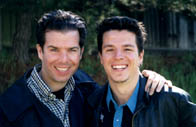English and Tuvan w/ English subtitles
Audience Award for Documentary at Sundance
 Have you ever heard of Tuvan throatsinging? I had never heard of it, let alone listened to it, until I saw Genghis Blues. Have you heard of Tuva? Me, ditto above. Tuva is a minuscule country in Central Asia. Throatsinging is a immensely fascinating craft of music, singing, where the sound produced falls in a very wide octave range as separate multiple octave sounds simultaneously. When sung low (they call it 'kygaraa') it sounds like didgeridoo, when high, it can be an earsplitting piccolo. Amazing.
Have you ever heard of Tuvan throatsinging? I had never heard of it, let alone listened to it, until I saw Genghis Blues. Have you heard of Tuva? Me, ditto above. Tuva is a minuscule country in Central Asia. Throatsinging is a immensely fascinating craft of music, singing, where the sound produced falls in a very wide octave range as separate multiple octave sounds simultaneously. When sung low (they call it 'kygaraa') it sounds like didgeridoo, when high, it can be an earsplitting piccolo. Amazing.
Anyway, enough about throatsinging, because this doco follows the journey of Paul Pena, a blind blues musician, with his friends to Tuva to learn more about throatsinging. So he leaves America for a small country in the middle of Asia which few people would have ever heard of, so unknown that there is no Tuvan-English dictionary, only Tuvan-Russian, then Russian-English. So here, music is the universal language. Genghis Blues is a heartful postcard about friendship based on this universal language. The picture on the postcard is the beautiful, untouched, pure landscape of Tuva, picturesque in its yet sometimes grainy images, and so full of naive kindness and joy of the village people of Tuva. The music is on the postcard, written and pictured, different types of throatsing for different occasion and landscape; the rivers, the mountains, the green fields, the snowy hills, throatsinging Tuvans, and the Tuvan throatsinging symposium the Tuvans and our American friends, especially Paul, are so passionate about.
This postcard, however, still has to remind us of their home and Paul's in America. This blind, unkempt artist is often mistaken as a bum on the streets of his own town, while in Tuva he is worshipped like a god (they call him 'Earthquake'), people just flock around him with faces full of excitement and eyes shining with interest, although his songs are simply based on his 50-word Tuvan vocabulary, nothing glam or political, just a simple greeting or thanks.
 There are happy moments, like the singing competitions (the grand prize is a horse), the times when Tuvans sincerely appreciate Paul, the happiness and delight Paul's music brings to them (which Paul can only feel and hear but not see), and the jokes cracked between the boys and the Tuvans. It is even inspiring just to hear the Tuvan guides wholeheartedly laughing and bringing Paul closer to Tuva, its land and culture. The sad moments are the cost of the journey: Mario Cassata (one of the tour member - he finally passed away about a year after the trip) falling ill, Paul's medication shortage, Paul's songs composed in the bleak moments, but they are moments most travellers experience. Unpolished and modest, this documentary is a touching experience, made with lots of dedication and no high expectations, beautifully shot with so much appreciation to culture and music and tradition without exploitating its exoticism.
There are happy moments, like the singing competitions (the grand prize is a horse), the times when Tuvans sincerely appreciate Paul, the happiness and delight Paul's music brings to them (which Paul can only feel and hear but not see), and the jokes cracked between the boys and the Tuvans. It is even inspiring just to hear the Tuvan guides wholeheartedly laughing and bringing Paul closer to Tuva, its land and culture. The sad moments are the cost of the journey: Mario Cassata (one of the tour member - he finally passed away about a year after the trip) falling ill, Paul's medication shortage, Paul's songs composed in the bleak moments, but they are moments most travellers experience. Unpolished and modest, this documentary is a touching experience, made with lots of dedication and no high expectations, beautifully shot with so much appreciation to culture and music and tradition without exploitating its exoticism.
Me? 'Race Around the World'? San Fransisco to see the Belic brothers (roko and adrian, below) and the ailing Earthquake, then to Tuva. I'll send you a postcard.
 natalia laban
natalia laban
comments? email the author
return to Sydney Film Festival 1999 index
read a review of Genghis Blues by adam rivett, cross-referencing Rolling Stone lyrics to his personal experience of the film
visit the Official Genghis Blues website